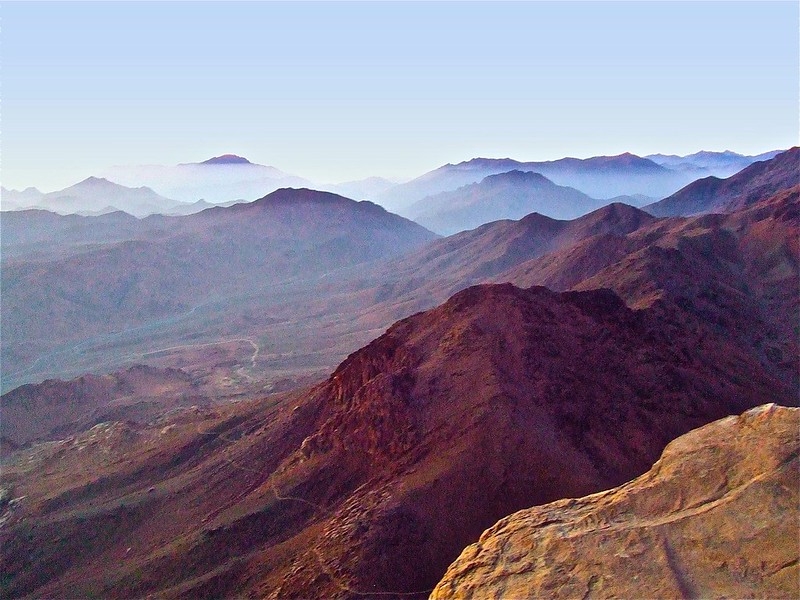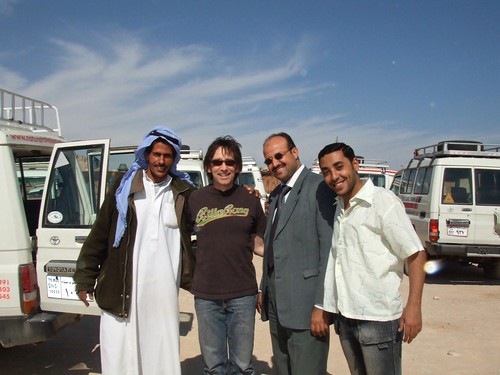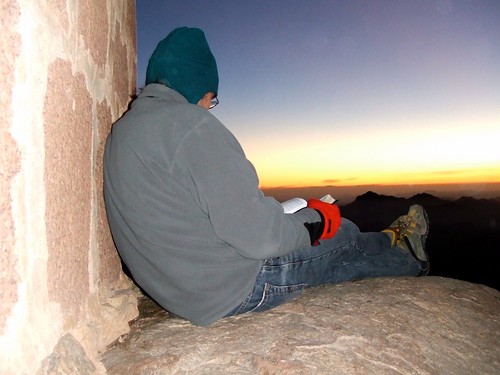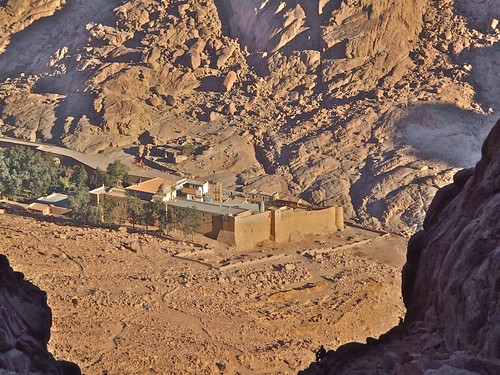Patience

Sunrise from Mount Sinai, November 9, 2006
PATIENCE
Brian Zahnd
The first Sunday in November, 2006, we celebrated the twenty-fifth anniversary of Word of Life Church. Following the services Peri and I flew to Tel Aviv and from there to Eilat on the Red Sea. The next morning, with luggage in tow, we walked across the border to Egypt where we were met by Mina — a Coptic Christian guide, Akhmed — a Bedouin driver, and Mohammad — an Egyptian security guard from Cairo. We were on our way to climb Mount Sinai. I had made an appointment to meet God on the summit of Sinai at sunrise on November 9, 2006. This was the thirty-second anniversary of my teenage encounter with Jesus and, as I thought of it, the beginning of the second half of my ministry. I wanted to re-consecrate my life and ministry on the mountain where Moses met with God.
Introductions were made, the five of us piled into a Toyota Land Cruiser, and we headed into the desert…off road. Only a Bedouin driver familiar with the Sinai wilderness could have pulled this off. It was an unbelievably rough ride and I was terribly carsick. After stopping along the way to explore the Colored Canyon and have a meal at a Bedouin camp, we reached our lodging around 10:00 p.m. We were up at 2:00 a.m. to climb the mountain. It was a short night. We were told it would take us about four hours to reach the summit, but we made it in two. So for another two hours we shivered in the dark in freezing temperatures awaiting sunrise. But the cold, dark wait was worth it. It was the most memorable sunrise of my life. We kept our appointment with God and then began our descent. By mid-morning we arrived at St. Catherine’s Monastery at the foot of the holy mountain. This monastery dating back to the fourth century is the oldest site of continuous Christian worship in the world. Orthodox monks have been praying here day and night for seventeen centuries. I wanted to join them in prayer. At first the monks refused since we were not Orthodox, but with a bit of pleading and cajoling they allowed us into the chapel where we added our voices to seventeen centuries of prayer.
In my visits to Assisi, Notre Dame, the Church of the Holy Sepulchre, and St. Catherine’s Monastery I’m reminded of the antiquity of Christianity. This reminds me that I can afford to be patient. The church has been going about its work of making disciples for nearly two thousand years…and for all we know we are still the early church! (If the suggestion that we might still be the early church irritates you, could it be that I have struck a nerve of impatience?) During the Jesus Movement of the 1970s, we were all convinced that Jesus would return within a decade, two at most. We couldn’t imagine a twenty-first century dawning prior to the second coming of Christ. Looking back on those days I realize that our eschatology wasn’t based in any sound reading of Scripture, but in childish impatience. Everything had to happen in our lifetime. We could not be content to be faithful in our generation and hand the task over to the next generation. No, we had to be the “omega generation.” We were impatient. Of course, impatience is a hallmark of immaturity. It’s the droning query from children in the backseat — “Are we there yet?”
To live a peaceable life, patience is needed. Impatience instills a permanent agitation in the soul, an agitation that makes peace impossible. Prayer is the slow process by which patience replaces agitation. Learning to pray well has acquainted me with patience. Praying the ancient psalms and the centuries old prayers of the church cultivates an appreciation for patience. I’ve come to realize that the main purpose of prayer is not to change the world, but to change me…and I am under the assumption that this will take a lifetime. I might naively think the world can be changed in a decade or two, but I know good and well it will take the better part of a lifetime to change me. So in prayer I learn to be patient, even with myself. Isaiah imagined the people of God as oaks of righteousness (see Isaiah 61:3). We grow like oak trees, not dandelions. Spiritual formation happens over a lifetime, not overnight. In a brilliant act of theft, Eugene Peterson lifted a phrase from Friedrich Nietzsche when he described Christian discipleship as “a long obedience in the same direction.” That’s as good a definition of patience as any — a long obedience in the same direction. Those looking for instant results instead of a long obedience will find the Christian life disappointing.
Patience is the heart of wisdom. Impatience is the essence of foolishness. Stanley Hauerwas has correctly observed that “war is impatience.” When we are impatient — whining from the backseat, “Are we there yet?” — we inevitably become frustrated and quarrelsome. When we demand “results” on our own timetable, we will most likely find ourselves out of step with the patient pace of historic Christianity. Impatient saints don’t exist. The saints have learned the secret of being patient with the world, with themselves, and even with God. The kingdom of Christ has more in common with an Italian three-hour lunch than with an American drive-though window. We may be in a hurry, but it seems God never is. Coming to terms with the “slowness” of God is what we mean by patience. In my youth I regarded my own impatience as a kind of virtue, now I see it as folly, a cousin to selfishness. Today I’m trying to learn how to mature like a dusty bottle of wine patiently resting in God’s cellar. If nothing particularly notable happens in church history during my lifetime, I’m fine with that. It’s not my church. It’s not my world. It’s God’s church and God’s world, and God has time on his side. I can afford to be patient.
—Water To Wine, pp. 119-122

L-R: Akhmed, BZ, Muhammad, Mina

Waiting for sunrise.

Saint Catherine’s Monastery